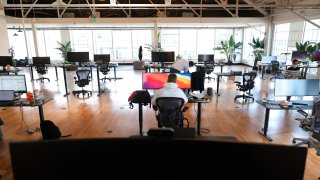
- Employees want — and demand — hybrid schedules, but what they really want is flexibility, experts say.
- Companies that allow workers to determine their own schedules may be more successful in retaining talent.
- Training managers to value something other than face time is vitally important in this new work model.
Students are back in school, the summer is nearly behind us, and more workers are returning to the office, adapting to the hybrid schedules that their companies have put in place.
But even with countless surveys and studies showing that employees want — and are in fact, demanding —a blend of remote and in-person work, is a hybrid schedule really what they're looking for?
Some experts are saying no.
Get top local stories in San Diego delivered to you every morning. >Sign up for NBC San Diego's News Headlines newsletter.
That's because the concept of a hybrid schedule suggests an employee will be in the office on certain days and working remotely, whether that's at home, offsite, at a coffee shop, on the others. More often than not, however, the decision on which days each of those things happens is dictated by the company, not the employee.
After more than 18 months of workers managing career responsibilities and their lives — and experiencing just how much flexibility is needed to do both — the idea of having to adhere to a hybrid schedule set by an employer may not be the ideal solution.
Instead, what workplace experts and some CHROs are now saying is that what workers really need is flexibility — the ability to figure out for themselves which days are in the office and on which days remote is best. The distinction may sound like mere verbiage, the experts acknowledge, but the difference could mean keeping valuable workers or watching them walk out the door.
Money Report
Colleen McCreary, chief people officer at Credit Karma, says that over the past several months she has had to remind leaders at her company that hybrid is not the arrangement they're offering to workers. "A few of them have spoken on panels and used that word and I had to tell them not to," she says.
Credit Karma isn't asking workers to return to its offices in Oakland, California, and Charlotte, North Carolina, until January, but when they do, the in-office schedule will be flexible and determined by the employee and manager, not set company-wide.
"If my kid has soccer on Thursdays and I have to be in the office all day on Thursday and can't get him there, that may be hybrid, but it's not flexible and isn't working for me," McCreary says. "We're trying to empower employees and teams to take responsibility for what works for them rather than wait for us to set it."
Technology to help flexibility
Giving workers autonomy over their schedules doesn't release companies from all decision-making, of course. Software and digital platforms that give organizations visibility into the entire workforce — who's in the office, occupancy trends, who's vaccinated — are vitally important as well, says Jonathan Fishman, founder of BizyDev, a business development firm.
"Without that kind of system and strong communication standards I think companies are going to be handicapped when it comes to adapting to a more flexible model," he says.
One company he's working with that's providing this technology is Kettle, a platform and mobile app that enables companies to manage flexible work arrangements. The app lets employers understand who's in the office on which days, how to accommodate meetings of different sizes, and allows them to communicate to workers any changes in Covid-19 protocols. "All the logistical framework is organized and seamless," Fishman says. "That's so important because things keep shifting and companies have to keep up."
Leaders are finding they need to keep up as well. Ellen Kullman, the former CEO of DuPont, and now chief executive of Carbon, a 3D printing technology company, says she's changed her outlook significantly since the beginning of the pandemic.
"I was very old-school in the beginning, thinking that we're all going back to the office," she says. But after she sent her entire workforce of approximately 500 people to work from home, she realized not only that productivity didn't suffer, it actually improved. "Finance was closing the books two days faster than when they were in the office," she says.
Some of Carbon's hardware engineers are back in the office, but for the most part, she's telling employees to figure out the schedule that makes the most sense for them. "I'm a big believer that it's not showing up at a certain time and leaving at a certain time that matters," Kullman says. "It's getting the work done."
Her focus moving forward is to help train Carbon's managers in this new work paradigm. "We're all coming to recognize after this pandemic that face time does not equate to performance," she said. That doesn't mean that companies should lower their standards in any way, Kullman is quick to add.
"We're giving people flexibility to work in a way that suits their life, but we're also holding the bar high on performance. That's good for companies and employees."






